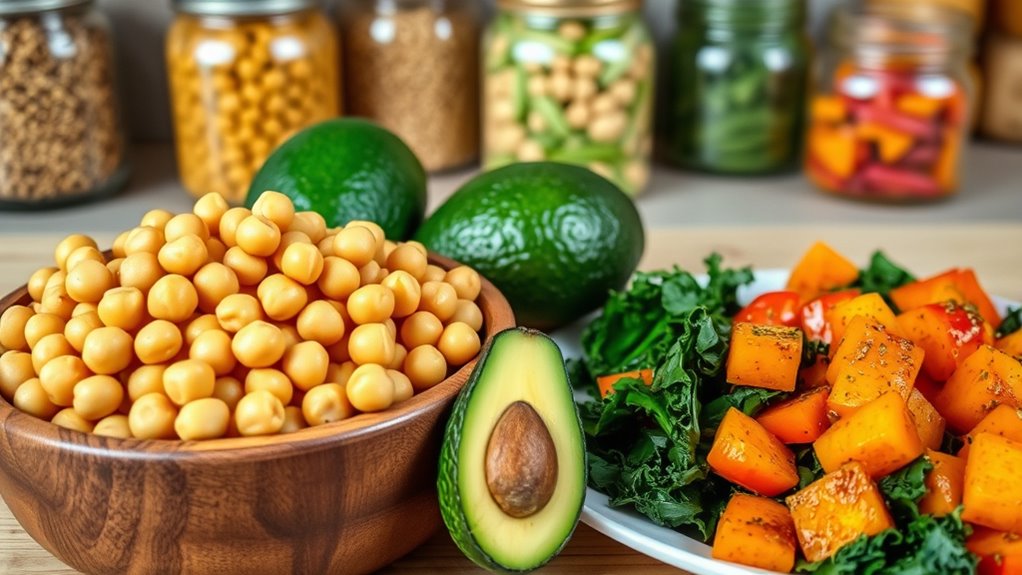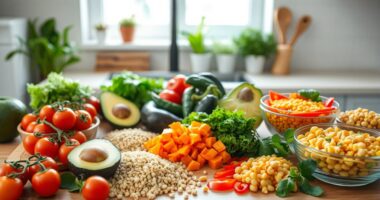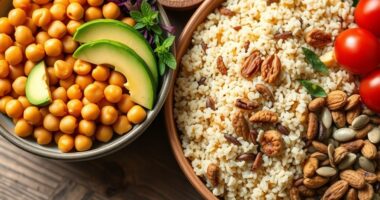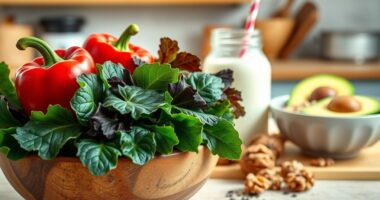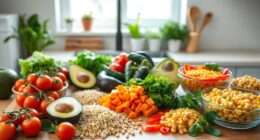To gain weight and build muscle on a vegan diet, focus on nutrient-dense, calorie-rich plant foods like nuts, seeds, dried fruits, and energy bars. Incorporate high-protein options such as lentils, chickpeas, tofu, and quinoa into your meals. Boost your calorie intake with tasty smoothies using bananas, plant-based protein powder, and nut butters. Staying consistent with these strategies will help you maximize muscle growth and healthy weight gain—discover more tips to support your journey.
Key Takeaways
- Incorporate calorie-dense, nutrient-rich foods like nuts, seeds, dried fruits, and wholesome smoothies to support healthy weight gain.
- Prioritize plant-based protein sources such as legumes, tofu, tempeh, and quinoa in every meal to promote muscle growth.
- Use tasty, high-calorie snacks and energy bars between meals or post-workout to boost daily caloric intake.
- Combine plant-based proteins with healthy fats to optimize muscle repair and overall nutrient intake.
- Consistently include diverse, whole-food plant ingredients to sustainably support weight gain and muscle development.
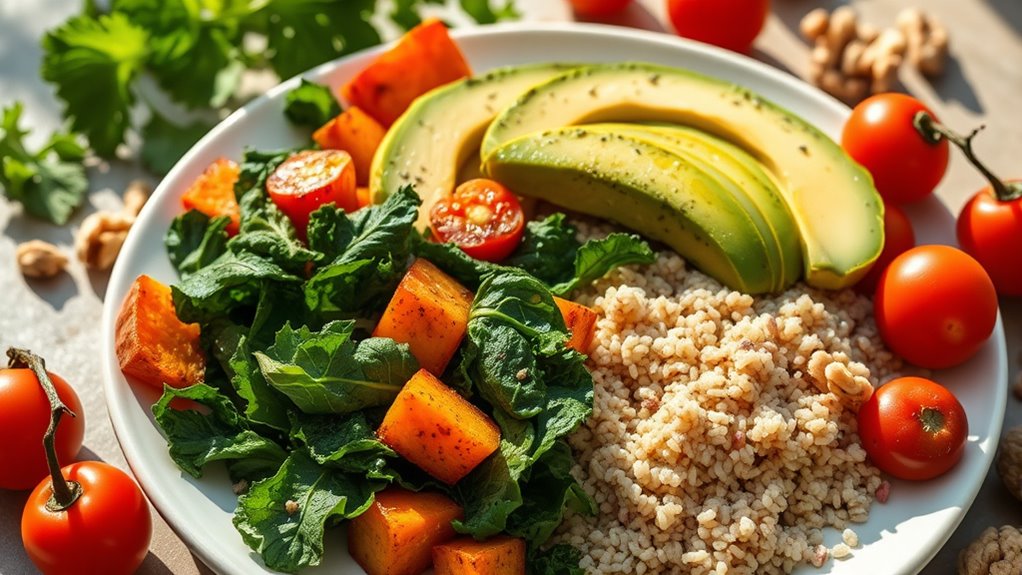
Gaining weight on a vegan diet can be healthy and sustainable if you focus on nutrient-dense foods that support your goals. Building muscle and increasing your overall mass requires more than just eating more; it’s about choosing foods that pack a punch in both calories and nutrients. Incorporate tasty protein smoothies into your routine—they’re an easy way to boost your calorie intake while providing essential amino acids from plant-based sources. Blend together ingredients like bananas, plant-based protein powder, nut butter, oats, and plant milk to create a delicious, high-calorie drink that fuels muscle growth and helps you reach your weight goals.
In addition to smoothies, calorie-dense snacks are your secret weapon for consistent weight gain. Think nuts, seeds, dried fruits, and energy bars made from wholesome ingredients. These snacks are convenient, portable, and rich in healthy fats and calories, making them perfect for between meals or post-workout recovery. For example, a handful of almonds or trail mix can add significant calories without making you feel overly full. Nut butters—like peanut, almond, or sunflower—are versatile, delicious options that can be spread on whole-grain bread, added to smoothies, or stirred into oatmeal for extra calories and flavor.
To maximize muscle building, focus on including high-protein plant foods in every meal. Legumes such as lentils, chickpeas, and black beans are excellent sources of protein and fiber, helping you repair and grow muscle tissue. Quinoa, tofu, tempeh, seitan, and edamame also pack a punch in protein content, making them ideal staples. Incorporate these into salads, stir-fries, or grain bowls to ensure you’re consistently fueling your body with the nutrients it needs for growth.
Frequently Asked Questions
Can Vegans Gain Muscle Without Supplements?
Yes, you can gain muscle without supplements by focusing on plant-based meal planning and incorporating nutrient-dense foods. Prioritize protein-rich options like beans, lentils, tofu, and tempeh, and include healthy fats and complex carbs. Use vegan snack ideas such as hummus with veggies, nuts, and seeds to boost calorie intake. Consistently challenging your muscles with strength training helps you build muscle naturally, making supplements unnecessary when you eat well.
What Are the Best Plant-Based Protein Sources?
Powerful pulses, potent grains, and savory seeds top the list of best plant-based protein sources. You can boost your intake by pairing plant proteins, like beans with rice or hummus with whole wheat bread, to guarantee you get complete vegan amino acids. Focus on diverse plant protein pairing to maximize muscle gains, making your meals more meaningful and muscle-friendly, all while fueling your vegan journey with nutrient-rich foods.
How Many Calories Should Vegans Consume Daily?
You should aim for about 2,000 to 2,500 calories daily, depending on your age, activity level, and goals. Focus on meal timing to fuel your workouts and recovery, and stay hydrated with proper hydration strategies throughout the day. Listening to your body’s hunger cues helps prevent overeating or under-eating. Adjust your intake as needed, especially if you’re building muscle or gaining weight.
Are There Specific Vegan Foods to Avoid for Weight Gain?
Imagine filling your plate with vibrant, whole foods instead of processed foods and refined sugars, which can hinder your weight gain goals. You should avoid these foods because they offer little nutritional value and can cause energy crashes, making it harder to build muscle. Instead, focus on nutrient-dense options like nuts, seeds, legumes, and whole grains to support healthy, sustainable weight gain on your vegan journey.
How to Balance Macronutrients for Muscle Growth?
You should aim for balanced macronutrient ratios, like 40% carbs, 30% protein, and 30% fats, to support muscle growth. Prioritize plant-based protein sources, complex carbs, and healthy fats. Spread your meals evenly throughout the day and consider post-workout nutrition to optimize recovery. Staying consistent with meal timing helps your body efficiently use nutrients, ensuring you build muscle effectively while maintaining energy levels.
Conclusion
Now that you know how to build muscle on a vegan diet, you’re well on your way to a stronger, healthier you. Keep fueling your body with nutrient-dense plant foods, stay consistent, and enjoy the journey. Remember, Rome wasn’t built in a day—so be patient and trust the process. With dedication and the right choices, you’ll see progress before you know it. Stick with it, and your efforts will pay off in the long run.

